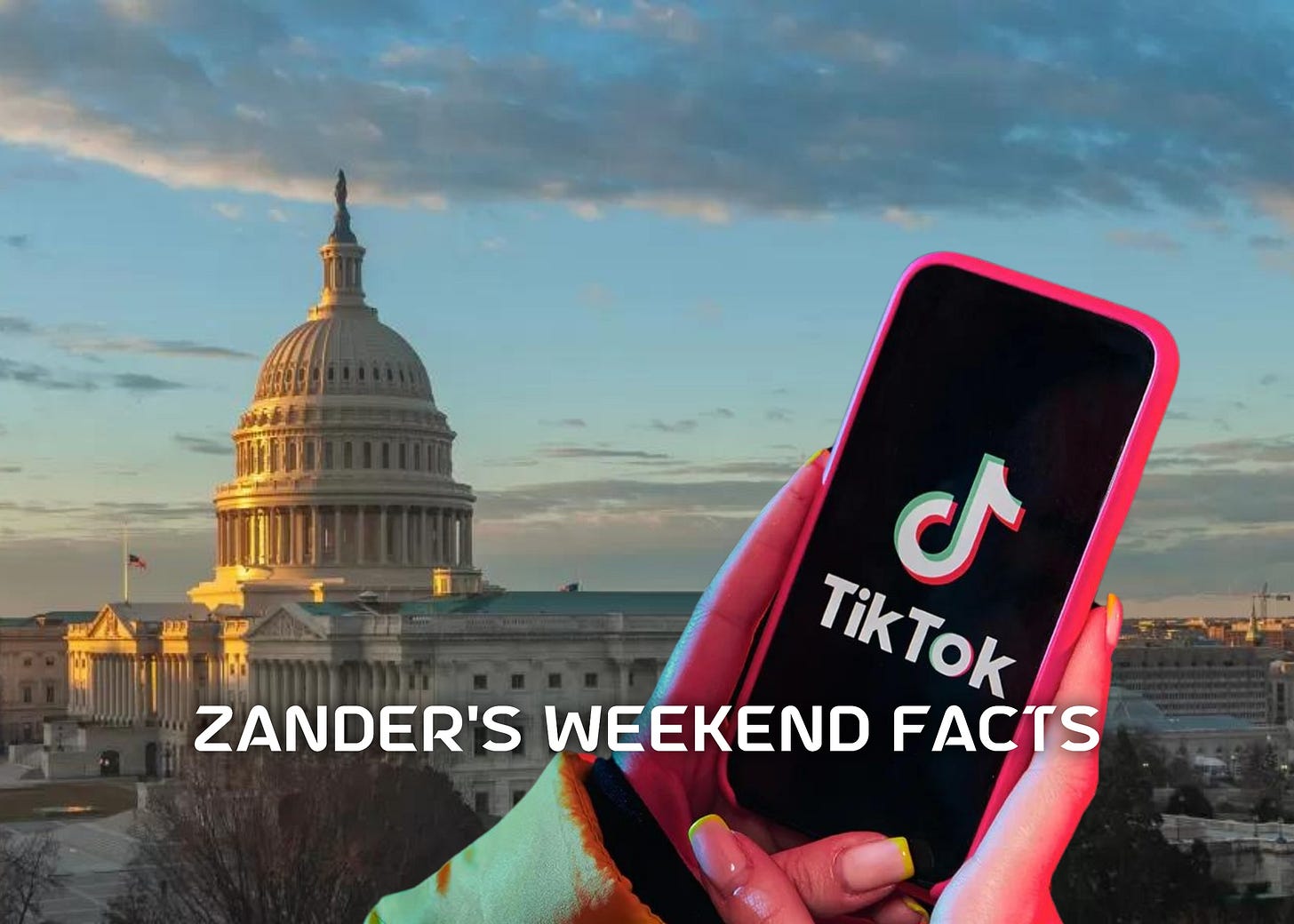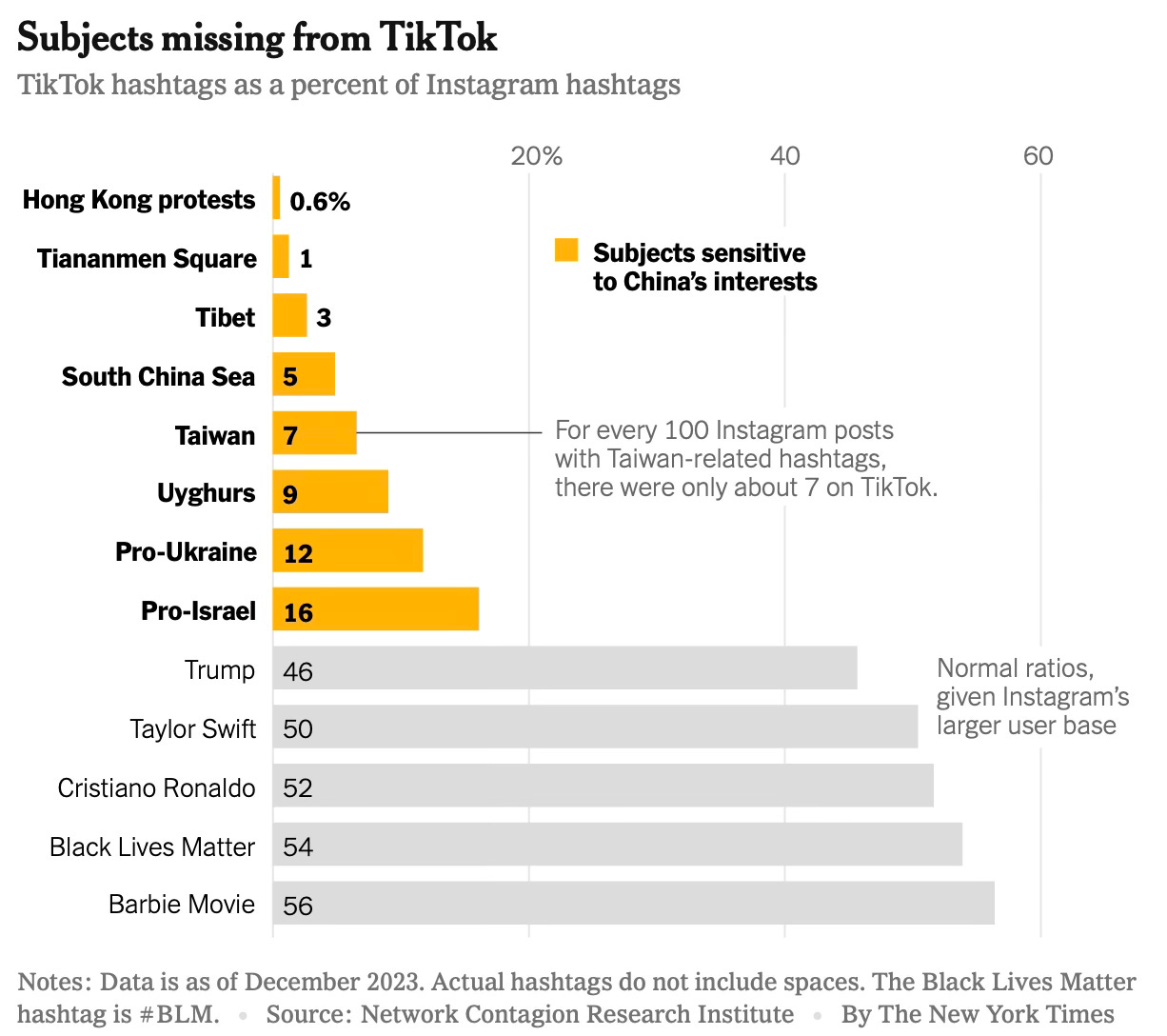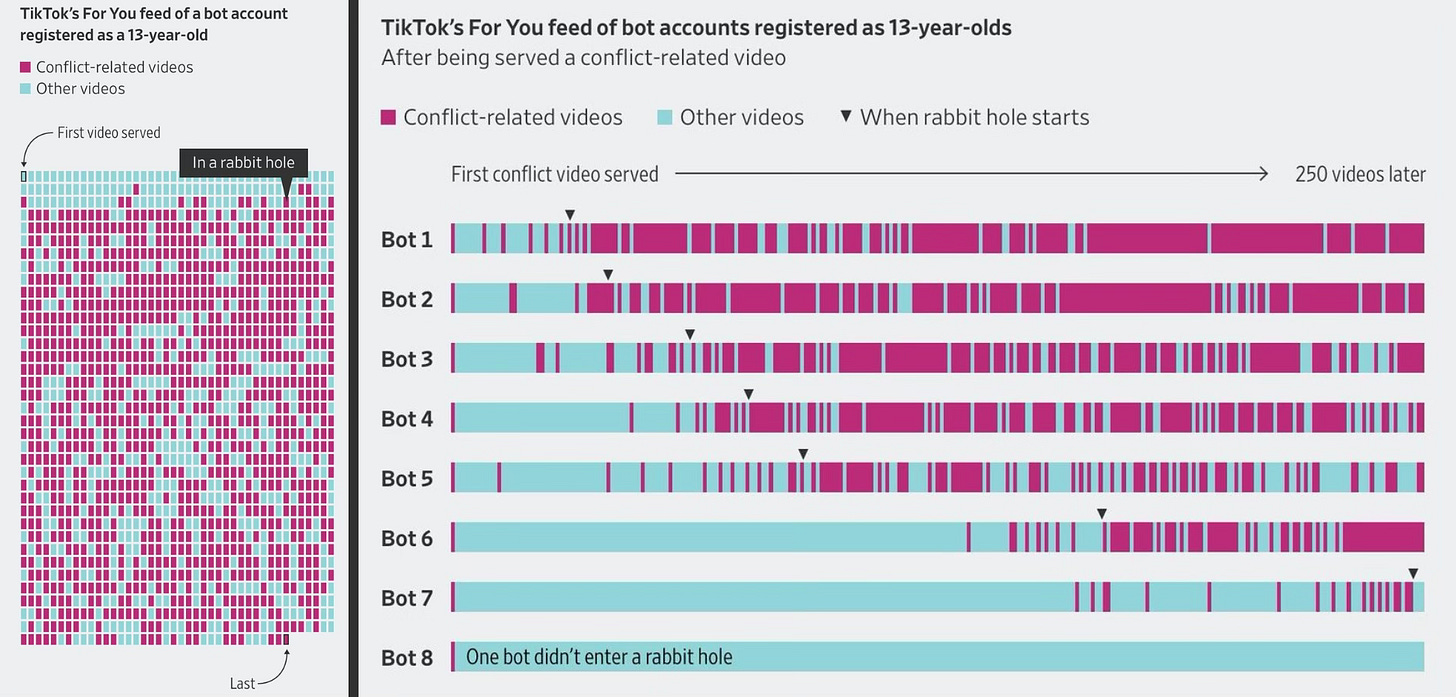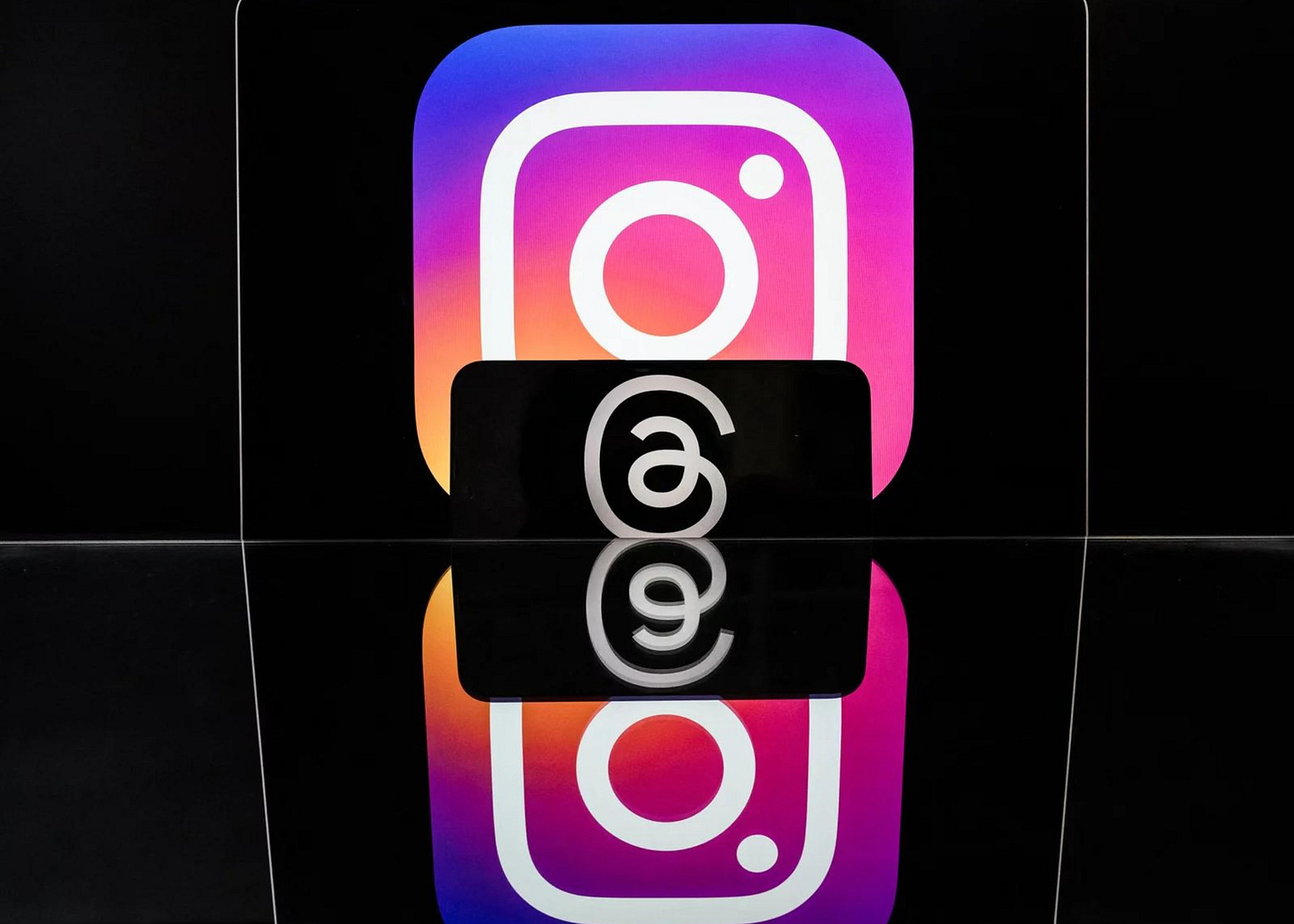ZWF: TikTok could be going away, and that's a good thing
Zander's Weekend Facts #116: Sunday, April 28, 2024
Inside this week’s edition of Zander’s Weekend Facts, a bill forcing a sale or shut down of TikTok has passed, and a look at what Zander’s been reading this past week. Plus, a compilation of the top headlines you need to know about from the last seven days.
Also, go listen to the latest episodes of the Zander’s Facts Podcast! Episode 137 features a preview of the NBA Playoffs with Zander’s Facts senior NBA analyst Hill Billy. Download the Zander’s Facts podcast wherever you get your podcasts!
Here are Zander’s Weekend Facts for Sunday, April 28, 2024:
Biden signs forced TikTok sale bill into law
The preferred social media app of many young Americans could soon be going away.
On Wednesday, President Joe Biden signed a $95 billion foreign aid package into law that provides assistance to Ukraine, Israel, Taiwan, and Palestinian humanitarian aid. Also included in the bill is a provision that forces ByteDance, the owner of TikTok, nine months to sell the app or face a ban in the United States. ByteDance is a technology company headquartered in Beijing, China that owns several other apps in addition to TikTok.
Now that the bill is law, time is officially ticking. Of course, if ByteDance gets its way, the law will get blocked in court. When Congress passed the bill, lawmakers on both sides of the aisle cited national security concerns coming from TikTok’s ties to China as the main reason for the bill. However, ByteDance is expected to file a lawsuit against the measure, likely invoking the First Amendment and free speech rights. Other groups that have opposed the measure, such as the American Civil Liberties Union, could join in on any lawsuit as well.
ByteDance has fought back successfully against previous attempts to restrict TikTok in the states. When former President Donald Trump’s administration attempted to cease operations of the app in the U.S. back in 2020, a federal judge ruled against the order. Another federal judge has ruled against a Montana law that sought to ban the app in the state last year.
And I’ll admit, I’ve been a supporter of TikTok for quite some time (as someone who typically spends a not insignificant amount of time on the app.) But my tune has now changed, for several reasons.
First off, ByteDance’s initial reaction to the forced sale bill becoming law has been severely troubling. Reuters reported last week that if it can down to it, ByteDance would likely rather shut down the app in the U.S. than sell it. (Because to clarify once again, the bill does not solely force TikTok to shut down. It forces a sale of the app, and if the owners do not sell, then it could be shut down.) You have to ask yourself that if ByteDance, and effectively the Chinese government, had the option to sell TikTok for tens of billions of dollars, and simply decided to shut down the app instead, what are they hiding? Could it be that ByteDance is actively collecting and storing data that constitute a national security risk and it doesn’t want other outside parties to discover this? (Multiple reports last year from Forbes and The Wall Street Journal confirm that U.S. user data is being stored in China.)
Additionally, recent reporting has found that TikTok is clearly influencing the viewpoints of its users (many of whom would be considered young in age.) Both The New York Times and The Wall Street Journal put out articles last week that take a close look at TikTok’s algorithm and its troubling tendencies.
The New York Times used data from recent research to show how “China uses TikTok as a propaganda tool.” The article reads:
Posts related to subjects that the Chinese government wants to suppress — like Hong Kong protests and Tibet — are strangely missing from the platform, according to a recent report by two research groups. The same is true about sensitive subjects for Russia and Iran, countries that are increasingly allied with China.
Here’s a graph the NYT made featuring data from a survey conducted by the Network Contagion Research Institute:
As we all should know, using Instagram as a comparison tool is far from perfect. However, it is likely no consequence that for every 100 Instagram posts with hashtags related to the Hong Kong protests or the 1989 Tiananmen Square massacre, there were one or fewer TikTok posts.
The Wall Street Journal delved into how TikTok is influencing opinion regarding the ongoing Israel-Hamas conflict in the Middle East. Here’s how the article began:
Imagine your 13-year-old signs up for TikTok and, while scrolling through videos, lingers on footage of explosions, rockets and terrified families from the war in Israel and Gaza.
Your child doesn’t search or follow any accounts. But just pausing on videos about the conflict leads the app to start serving up more war-related content.
That’s what happened to a handful of automated accounts, or bots, that The Wall Street Journal created to understand what TikTok shows young users about the conflict. Those bots, registered as 13-year-old users, browsed TikTok’s For You feed, the highly personalized, never-ending stream of content curated by the algorithm.
Within hours after signing up, TikTok began serving some accounts highly polarized content, reflecting often extreme pro-Palestinian or pro-Israel positions about the conflict. Many stoked fear.
The Journal showed two graphs that demonstrate how easily you can fall into rabbit holes on the app, as demonstrated by the videos their bots, who were registered as 13-year-olds, were shown:
As the data shows, once you start to receive and engage with videos regarding the conflict, you continue to get them.
And the algorithm doesn’t just act this way in regards to the Israel-Hamas conflict. For instance, I recently engaged in a few videos featuring comedian Conan O’Brian that were trending because of O’Brian’s publicity tour promoting his new television show. Suddenly, my whole feed was only videos of Conan, which I’m not complaining about because Conan is awesome, but it shows how you can easily be infiltrated with many videos on a single topic, whatever that topic may be.
While that may not always be an issue, it can be when TikTok continues to recommend videos that don’t exactly tell the truth, or in other words, spread blatant misinformation. The Journal found that the bots registered as 13-year-olds were being shown videos that claimed the U.S. “has decided to exterminate all Arab countries”, claimed that World War 3 was imminent, and suggested that “the Nile River had run blood red, with a reference to the Biblical end of times.” (That last claim was explicitly debunked as false.)
The Journal also found that TikTok continued to show videos that showed excruciatingly graphic content to accounts that were supposed to be 13-year-olds. These came both from accounts that were pro-Israel as well as accounts that were pro-Palestine.
As more and more Americans claim to be getting their news from the app (almost one-third of U.S. adults between the ages of 18 and 29 according to the Pew Research Center), it is extremely concerning that it’s coming from an app that has been found repeatedly of spreading misinformation and doing little to combat it.
Not to mention the fact that ByteDance, as previously noted, is headquartered in China, a country whose communist government has been increasingly cracking down on the dealings of private businesses. As FBI Director Christopher Wray put it during a congressional hearing last year, “This is a tool that is ultimately within the control of the Chinese government - and it, to me, it screams out with national security concerns.”
It’s pretty clear at this point that the Chinese government is using TikTok as a way to infiltrate the minds of tens of millions of Americans, particularly younger age groups who could be more susceptible to misinformation and conspiracy theories. The fact that they appear set on not selling the app and collecting a massive payday almost solidifies the notion that there are shady dealings going on.
The status quo cannot be maintained, TikTok needs to be sold or shut down, for the sake of making sure a massive amount of our population doesn’t spiral down a rabbit hole it can’t leap out of.
For more information on this week’s top story, here’s an article from Politico - ‘Lost touch with reality’: How TikTok’s vaunted lobbying operation went wrong
What Zander’s been reading
Meta, which operates social media platforms Facebook, Instagram, and Threads, recently announced that it would automatically limit the amount of political content you see on your feeds. Of course, that may not suit your scrolling habits, so here’s a helpful guide to opting out of the new rules.
Check out this week’s featured article at NPR - Meta is limiting how much political content users see. Here's how to opt out of that - (Apple News link)
Zander’s Facts Sporting Club
Here are the top headlines from the sports world in the Sporting Club:
NBA Playoffs: Two teams in the NBA Playoffs are on the verge of sweeping their opponents and advancing into the Second Round. The Oklahoma City Thunder and Minnesota Timberwolves both lead their opponents, the New Orleans Pelicans and Phoenix Suns, with 3-0 series leads. Also in the Western Conference, the Denver Nuggets lead the Los Angeles Lakers 3-1 in the series, while the Dallas Mavericks have a 2-1 series lead over the Los Angeles Clippers. In the Eastern Conference, the Cleveland Cavaliers and Orlando Magic are knotted up in a 2-2 series. The Boston Celtics, Indiana Pacers, and New York Knicks all hold 2-1 leads in their series over their opponents, the Miami Heat, Milwaukee Bucks, and Philadelphia 76ers, respectively.
NHL Stanley Cup Playoffs: Four Eastern Conference teams are all one win away from advancing to the Second Round of the Stanley Cup Playoffs. The Florida Panthers, Boston Bruins, New York Rangers, and Carolina Hurricanes all lead their series by either 3-0 or 3-1 margins and are one win from moving on to the next round. In the West, all four of the First Round series currently sit at 2-1. The Vegas Golden Knights, Colorado Avalanche, Vancouver Canucks, and Edmonton Oilers all currently have advantages over the Dallas Stars, Winnipeg Jets, Nashville Predators, and Los Angeles Kings, respectively.
NFL Draft: The NFL Draft concluded on Saturday after 257 players were selected to join the professional football ranks. The Chicago Bears selected USC quarterback Caleb Williams with the first overall pick on Thursday. Williams won the 2022 Heisman Trophy and became the first USC player to be selected first overall since quarterback Carson Palmer in 2003. For the first time, six quarterbacks were taken with the first 12 picks in the draft, including the Washington Commanders selecting LSU’s Jayden Daniels and the New England Patriots picking North Carolina’s Drake Maye with the second and third overall picks.
Reggie Bush/Heisman: Reggie Bush, who won the 2005 Heisman Trophy as a running back at USC, was returned his trophy 14 years after forfeiting it. In 2010, Bush forfeited his trophy after the NCAA imposed sanctions on USC relating to Bush and others receiving improper benefits while they were student-athletes. The Heisman Trust cited “fundamental changes in college athletics” in making the decision to reinstate Bush’s trophy, referring to the practice of NIL and compensation that has allowed student-athletes to benefit from their name, image, and likeness.
UEFA Champions League: The Semifinals of the UEFA Champions League are set to begin this week with the first legs of each matchup. On Tuesday, Bayern Munich will host Real Madrid, while Borussia Dortmund will host Paris Saint-Germain on Wednesday. Both matches will kick off at 3:00 pm ET and air on CBS and Paramount+. Next week, the second legs will feature Real Madrid and Paris-Saint Germain hosting their respective matches on opposite days. Bayern-Madrid’s second leg will be played on Tuesday, May 7, and Dortmund-PSG on Wednesday, May 8, with both matches kicking off at 3:00 pm ET.
Rapid-fire Facts
These are top news headlines from the past week in rapid-fire fashion:
Foreign Aid Package: President Joe Biden signed into law the $95 billion foreign aid package on Wednesday. The bill provides over $60 billion for Ukraine in its fight against Russia, as well as aid for Israel, Taiwan, and other global hot spots. Biden immediately approved the first $1 billion of the package for Ukraine as the country seeks to halt recent Russian gains. It was also reported last week that the U.S. had secretly provided Ukraine with long-range ballistic missiles, which Ukraine has since used on Russian forces. While the bill provides $26 billion in aid to Israel, it also sets aside $1 billion for humanitarian relief for Palestinians in Gaza.
Airline Cancellation Rules: The Department of Transportation released new guidelines on Wednesday that will force airlines to provide quick compensation to passengers affected by cancellations or delays. Airlines will be required to provide a cash refund if a flight is canceled or delayed for three hours or longer on domestic flights and six hours or longer on international flights. The new rules also apply when the airport is changed or connections are added, and fliers can now get refunds when their baggage is at least 12 hours late. Additional rules released on Wednesday will require airlines to clearly disclose junk fees such as a surprise baggage fee upfront.
Non-competes: The Federal Trade Commission voted on Tuesday to prohibit most non-compete agreements. Noncompete agreements prevent workers from joining competing businesses or from starting their own competing businesses. When the ban takes effect later this year, the FTC says employers should no longer enforce existing non-compete agreements, with an exception for senior executives. The FTC estimates that 30 million American workers are under noncompete agreements and that prohibiting them could raise collective wages by nearly $300 million per year.
Trump Hush Money Trial: Arguments began last week in the case involving former President Donald Trump and his company’s involvement in sending payments to adult film actress Stormy Daniels before the 2016 presidential election. Prosecutors allege that Trump’s actions were part of a scheme to influence the results of the election, while Trump’s lawyers argued that he was conducting typical business transactions. During the week, former publisher of the National Enquirer tabloid, David Pecker, detailed a “catch and kill” agreement he and Trump had where Pecker would purchase stories unfavorable to Trump and not publish them.
Arizona Fake Electors: 18 individuals were indicted on Wednesday by an Arizona grand jury on charges relating to the scheme seeking to overturn the results of the 2020 presidential election. Those indicted took part in an attempt to use alternate electors for former President Donald Trump in Arizona, a state President Joe Biden won in the election. Among those indicted include former New York City Mayor Rudy Giuliani, former White House Chief of Staff Mark Meadows, and former Arizona Republican Party Chairwoman Kelli Ward. Trump himself was described in the indictment as “unindicted coconspirator 1.”
Wrapping up the Facts
Before this edition of Zander’s Weekend Facts wraps up, here’s another reminder to check out the latest episodes of the Zander’s Facts podcast. Download and listen to the latest episode of the podcast, along with every episode of Zander’s Facts, wherever you get your podcasts.
You can also listen to every episode of the podcast on this very website. All Zander’s Facts podcast episodes are now available on zandersfacts.com under the “Zander’s Facts” tab for your enjoyment! That includes the next episode of the Zander’s Facts Podcast, which comes out this Wednesday!
That’s a wrap on this week’s edition of Zander’s Weekend Facts. The facts in print return next Sunday, May 5, 2024.








